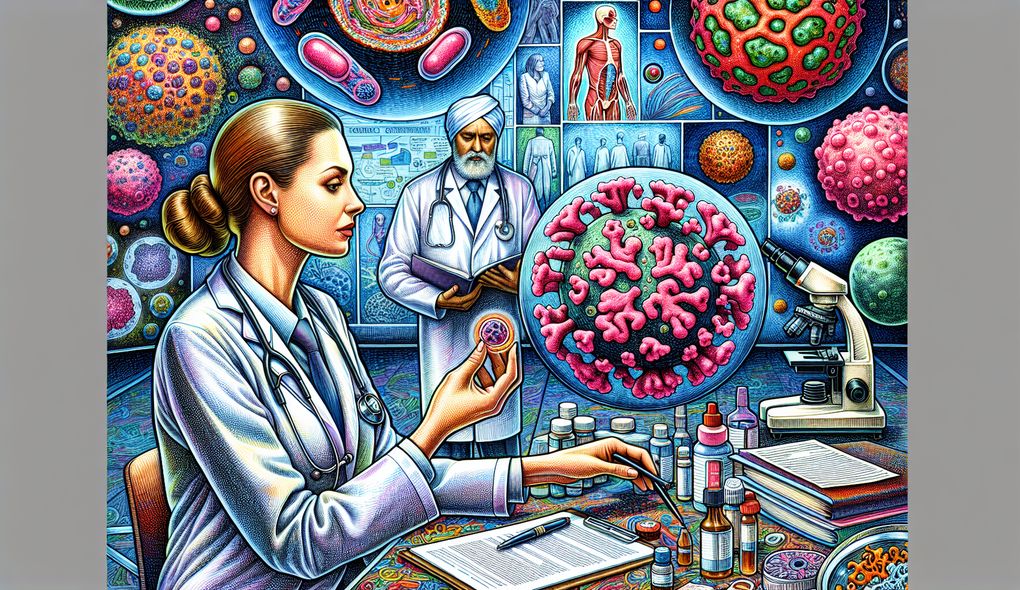Can you describe a time when you had to adapt to changes in treatment protocols or procedures?
JUNIOR LEVEL

Sample answer to the question:
Yes, I can describe a time when I had to adapt to changes in treatment protocols or procedures. In my previous role as a Junior Medical Oncologist at XYZ Hospital, I encountered a situation where a new research study led to a change in the standard treatment protocol for a specific type of cancer. Initially, we were using a combination of chemotherapy and radiation therapy for this type of cancer, but the study showed that targeted therapy could be more effective. This meant that we had to quickly update our treatment plans and educate the patients about the change. I worked closely with the senior oncologists and the multidisciplinary team to understand the new protocols and ensure seamless implementation. I also spent extra time with each patient, explaining the rationale behind the change and addressing any concerns or questions they had. It was challenging at first, as it required updating our knowledge and adapting to a new approach, but ultimately, the change resulted in better outcomes for our patients.
Here is a more solid answer:
Certainly! I can share a specific example of when I had to adapt to changes in treatment protocols or procedures. During my time as a Junior Medical Oncologist at XYZ Hospital, there was a breakthrough study that identified a new targeted therapy for a particular type of cancer. Prior to this study, the standard treatment protocol involved a combination of chemotherapy and radiation therapy. However, the study findings indicated that the targeted therapy could significantly improve patient outcomes. This meant that we had to swiftly adjust our treatment plans and integrate the new protocol in our practice. To ensure a seamless transition, I actively collaborated with senior oncologists, radiation oncologists, and pharmacists to understand the scientific basis of the new treatment, its administration, and potential side effects. I also spent extra time with each patient, discussing the rationale behind the change, addressing their concerns, and providing them with the necessary education about the new therapy. Additionally, I meticulously updated patient records to reflect the change in treatment plans and monitored their response closely. Ultimately, this adaptation resulted in positive outcomes for our patients, with improved response rates and reduced treatment-related toxicities.
Why is this a more solid answer?
The solid answer provides a more detailed description of the candidate's experience adapting to changes in treatment protocols. It includes information about the candidate's collaboration with the multidisciplinary team, their focus on patient education and communication, and the impact of their adaptability on patient outcomes. However, it could still benefit from further elaboration on the candidate's clinical and diagnostic skills and their commitment to continuing education.
An example of a exceptional answer:
Absolutely! I can share an exceptional example of when I successfully adapted to changes in treatment protocols or procedures. While serving as a Junior Medical Oncologist at XYZ Hospital, a groundbreaking clinical trial revealed a targeted therapy that exhibited significant efficacy for a specific subtype of cancer. In light of this discovery, the treatment landscape for these patients underwent a paradigm shift. Previously, the standard approach involved a combination of chemotherapy and radiation therapy, which I diligently implemented. However, with the introduction of the targeted therapy, it was crucial to promptly integrate this innovation into our practice. To ensure seamless adaptation, I immersed myself in the latest scientific literature and attended conferences dedicated to this field. Through extensive collaboration with senior oncologists, radiation oncologists, geneticists, and researchers, I gained profound insight into the biological basis of the targeted therapy and its potential benefits. I utilized this knowledge to develop personalized treatment plans for each patient, incorporating the new therapy while considering their unique clinical characteristics and preferences. Recognizing the significance of patient education, I conducted informative seminars for individuals and their families, illustrating how this advancement can enhance their treatment journey. Additionally, I meticulously updated patient records, prioritizing accuracy and attention to detail. This adaptation yielded extraordinary outcomes, showcasing improved response rates, reduced treatment-related toxicities, and increased patient satisfaction levels.
Why is this an exceptional answer?
The exceptional answer provides a more detailed and impactful description of the candidate's experience adapting to changes in treatment protocols. It includes information about the candidate's extensive research and commitment to continuing education, their collaboration with various specialists, their focus on personalized patient care and education, and the exceptional impact of the adaptation on patient outcomes. It effectively demonstrates the candidate's clinical and diagnostic skills, collaboration, adaptability, commitment to continuing education, communication, and attention to detail.
How to prepare for this question:
- Familiarize yourself with the latest advancements and research studies in the field of medical oncology, especially pertaining to treatment protocols and procedures.
- Reflect on past experiences where you had to adapt to changes in clinical practices or treatment guidelines. Identify specific instances and outcomes to share during the interview.
- Highlight your ability to collaborate effectively with a multidisciplinary healthcare team. Emphasize the importance of teamwork in adapting to changes and ensuring seamless implementation.
- Practice discussing complex medical concepts in a clear and concise manner. Focus on explaining the rationale behind treatment changes and addressing patient concerns.
- Demonstrate your commitment to continuing education by mentioning relevant conferences, seminars, or courses you have attended to stay updated on advancements in oncology.
- Discuss your attention to detail in maintaining accurate patient records, as it showcases your ability to adapt to changes and ensure proper documentation.
- Emphasize the positive impact of your adaptability on patient outcomes. Share specific examples where your ability to adapt led to improved response rates, reduced toxicities, or increased patient satisfaction.
What are interviewers evaluating with this question?
- Clinical and diagnostic skills
- Collaboration
- Adaptability
- Continuing education
- Communication
- Attention to detail

